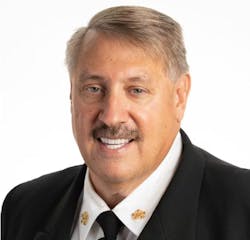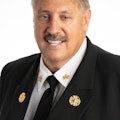Before my teenage years, I had an aquarium with guppies and black mollies. It was a cheap 5-gallon aquarium, and the fish were cheap. I was excited when I noticed some of the female guppies and mollies were pregnant and that I would soon have new babies in my aquarium. The baby guppies were born first and, the next day, I could not find them in the aquarium. I wondered, what happened to them? I said something to my grandmother, who lived with us, and she said that the larger fish probably ate them. I was blown away that guppies would eat their babies.
I was an eyewitness to the birth of the black molly babies, and indeed, I saw them being pursued by larger black mollies immediately after their birth. Their own mother was trying to eat them. I had to take action, using the fish net to rescue them, and placing them in a separate jar of water until they were large enough to be reintroduced back into the aquarium.
We’re no different in the fire service.
With a career spanning 46 years in the fire service, I've heard a particular phrase repeated time and again: "We eat our own." This sentiment was echoed even into my retirement, when I was recently teaching a class in front of a large firefighter’s association.
Just like the guppies in my childhood aquarium, we in the fire service have a tendency to consume our own. If you want evidence, just check out the comments on any working fire video posted on social media. The thread is usually full of negative comments from those who viewed the video: “He doesn’t have his chin strap hooked.” “He did not flake out the line right.” “He didn’t park the engine in the right location.” “They don’t even know how to raise a ground ladder. Their technique was wrong.” There is even one YouTuber who has his entire channel dedicated to criticizing and critiquing some working fire video that he posts.
Eating our own is not isolated to social media. How do we treat the fresh-faced rookies or any new volunteer who dares to join the local volunteer fire department? We bounce on them hard. The career rookies may endure silently, driven by the need for a job, but some volunteers may voice their discontent, saying, “This isn’t for me.” The unfortunate reality is that, much like the career fire service, the volunteer fire service struggles to attract and retain firefighters. Running people off does not help with retention.
There are undoubtedly traditions in the fire service that deal with the acceptance of newcomers into our ranks. I am not a psychologist, but I suspect, among other things, that it deals with determining whether the newcomer can handle stress. If they cannot handle the stress of a few zingers, how are they going to perform when all hell is breaking loose around them, and they have to step up and give 100 percent perfectly? Their role is crucial, and we need to ensure they are supported, not torn down.
How we treat our rookie firefighters is a delicate balance between pranks, bullying, hazing, and good-natured fun.
There is a fine line between pranks, hazing, or bullying; some are very serious. My official position as a chief officer is that harassment, hazing, and bullying of any firefighter is not to be tolerated. That is the same position as the fire service in general, as well as most all attorneys and human resource departments. There should be zero tolerance for hazing, bullying, and harassment.
I have seen situations where I had to step up and say “stop!” Once, I had to deal with a firefighter filling a rookie’s firefighter helmet with water and putting it in the freezer. I felt it was inappropriate, and if the firefighter had to respond, his safety equipment would have been compromised, so I put my foot down!
The reality in the fire service is that firefighters pull pranks and joke with the rookies. There is a fine line between pranks, hazing, or bullying and what some consider good-natured humor. Whether something is a prank, harassment, bullying, hazing, or just a good-natured joke depends upon the perspective of the person on the receiving end. Many are verbal jabs.
New firefighters may be the brunt of some jokes. Some may tell a new firefighter to get the blinker fluid, and ensure the fire engine is topped off so that the blinkers work correctly since they are blinking slowly and the fluid is getting low. They then watch the rookie firefighter search the station for the blinker fluid.
If older firefighters see a weak spot when the new firefighter gets irritated, expect the jokes and jabs to double in intensity. If they find out a new firefighter has some other weakness, such as phobia, expect it to be exploited. It happened to me.
Understanding what will cross the line is essential. Actions that are culturally insensitive, cause physical harm, have racial overtones, are gender-specific, religious, or sexual, or mess with someone’s safety equipment, or any other type of joke or prank crosses that line.
Some harmless pranks I have seen over the years include telling a rookie that it is time to switch the summer air out with the winter air in the engine tires, and that is their task for the day - of course, don’t let them do it. Or ask a rookie to shake the oxygen bottle to see if it is full or empty, or to look for the hose stretcher in one of the compartments. And when the rookie cannot find it, tell the rookie to call the other stations since they must have borrowed it.
When we start thinking of our rookies or new volunteers as punching bags and are nothing but cannon fodder for verbal insults, demeaning comments, and abuse, we begin to erode the desire of someone who wants to be a firefighter. Combine it with bad leadership from a company officer or a chief officer and we wonder why they have a terrible attitude three years later.
It is all right to challenge your rookie in drills and other training exercises to prepare them for when they will be called upon to perform, but you do not have to abuse them in the process with verbal insults.
I have always said you cannot lift people up when you are tripping them up.
Our job as seasoned firefighters and officers is to prepare our new firefighters and volunteers, not devour them.
About the Author
Gary Ludwig
GARY LUDWIG has served in three fire departments over his career: St. Louis, Memphis, and Champaign, IL. His fire, EMS and rescue career spanned a total of 46 years, and he has been a paramedic for over 44 years. Ludwig served as president of the International Association of Fire Chiefs in 2019-20. He has a Master’s degree in Business and Management, has written over 500 articles for professional fire and EMS publications and is the author of seven books.
Connect with Gary
Email: [email protected]
Facebook: Gary Ludwig
Twitter: @ChiefGaryLudwig
Website: garyludwig.com

